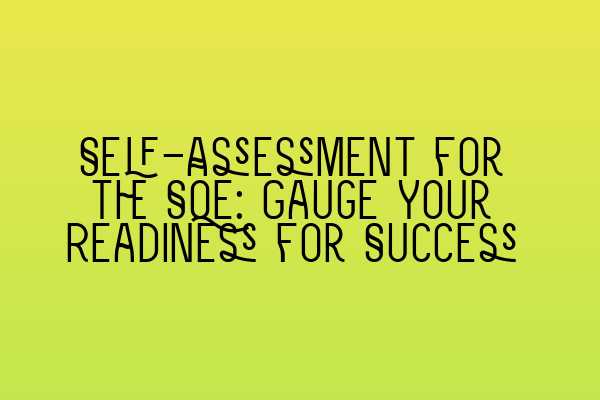Self-Assessment for the SQE: Gauge Your Readiness for Success
Preparing for the Solicitors Qualifying Examination (SQE) is a crucial step towards a successful career in law. As you embark on this journey, it is essential to evaluate your readiness and determine the areas you need to focus on to boost your chances of success. In this blog post, we will guide you through a self-assessment process that will help gauge your preparedness for the SQE and provide valuable insights for your study plan and exam strategy.
Understanding the SQE
Before diving into the self-assessment process, let’s briefly recap what the Solicitors Qualifying Examination entails. The SQE is a two-part assessment designed to assess the skills, knowledge, and competencies required to qualify as a solicitor in England and Wales. Part 1 focuses on functioning legal knowledge and covers topics such as property law, contract law, criminal law, and more. Part 2 tests practical legal skills, including client interviewing, advocacy, legal research, and writing.
To ensure you are fully equipped for success in both parts of the SQE, it is essential to assess your strengths and weaknesses and tailor your study plan accordingly.
Evaluating Your Legal Knowledge
The first step in our self-assessment process is to evaluate your legal knowledge. Take some time to reflect on the areas you feel confident in and those that require more attention. Are you well-versed in property law? Do you have a solid understanding of contract formation and termination? Make a list of the subjects you need to study in-depth and compare it with the SQE syllabus to ensure you cover all the necessary topics.
If you find that you need to brush up on certain areas, don’t worry! There are plenty of resources available to help you. Consider enrolling in workshops or training sessions that focus on specific subjects, such as our Land Law Workshops. These hands-on training sessions provide practical insights and guidance to enhance your understanding and application of property law principles. Additionally, you can explore our interactive SQE mock tests for property, which allow you to practice your knowledge and improve your exam performance.
Developing Practical Legal Skills
While solid legal knowledge is crucial, the SQE also assesses your practical legal skills. This includes the ability to effectively communicate with clients, conduct legal research, analyze cases, and draft legal documents. As part of your self-assessment, evaluate your existing practical skills and identify areas for improvement.
For example, if you find that you struggle with client interviewing or advocacy, consider seeking additional training and practice opportunities. Our article on legal considerations in residential leases provides essential insights for solicitors and can be a valuable resource for enhancing your client interviewing skills. Additionally, our article on lease laws in the UK unravels the legal framework for tenants, offering a comprehensive understanding of the subject.
Time Management and Exam Strategy
Effective time management is key to success in any examination, and the SQE is no exception. As part of your self-assessment, consider your ability to manage your time effectively during the exam. Are you able to allocate sufficient time to each question? Do you struggle with time pressure? Reflect on past exam experiences and identify any areas where you can improve your time management skills.
Furthermore, developing a solid exam strategy is crucial for optimizing your performance. Familiarize yourself with the format of the SQE, including the number and type of questions in each part. This will enable you to develop a strategic approach to tackle different question types and allocate your time wisely.
Continuous Improvement and Support
The self-assessment process is not a one-time task but an ongoing journey towards improving your legal knowledge and skills. Regularly revisit your self-assessment and update it as you progress in your preparation. Seek feedback from mentors, tutors, or study groups to gain valuable insights and areas for improvement.
Remember, success in the SQE requires dedication, perseverance, and a well-planned study strategy. By conducting a self-assessment and addressing your weaknesses, you can significantly enhance your chances of success in the examination.
Good luck with your SQE preparation journey!

Leave a Reply